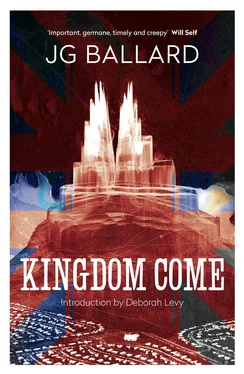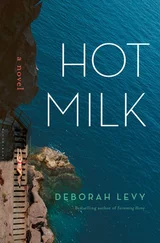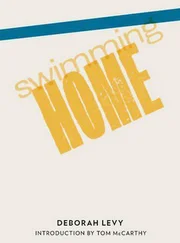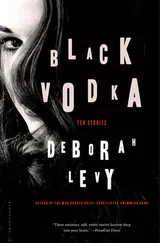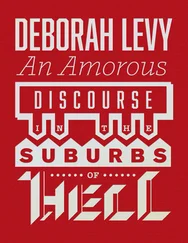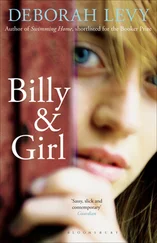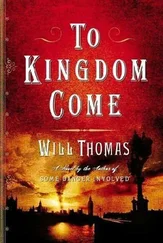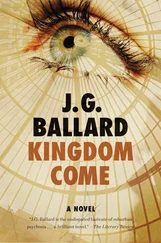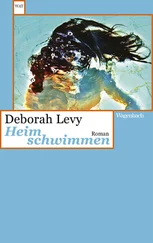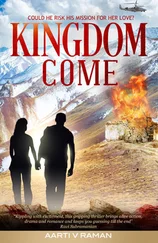I enjoyed his noirish female characters too (many of them doctors), enigmatic instead of domestic, emotionally unavailable, sexually experimental, sometimes tanned and thuggish, as in Cocaine Nights , or vulnerable but corruptible as in Kingdom Come – but the great thing is that they do not want the male lead to marry them and are never about to roast a chicken.
I believe in the beauty of all women, in the treachery of their imaginations, so close to my heart.
All these years later, I still marvel at the eerie poetry of Ballard’s prose. It lingers like a strange perfume over his concise, matter-of-fact sentences, more heightened in the earlier novels and short stories, but the bottom notes (petrol, anguish, desire, nightmares) are still present in the first three lines of his final and most didactic novel, Kingdom Come .
The suburbs dream of violence. Asleep in their drowsy villas, sheltered by benevolent shopping malls, they wait patiently for the nightmares that will wake them into a more passionate world …
Kingdom Come is an exuberant, crazed, maverick, twenty-first-century re-staging of Freud’s Civilisation and Its Discontents . We have our usual Ballardian narrator, a decent chap, former advertising executive Richard Pearson, who, while driving down the slow lane of the M25, is surprised to find the indicator ticking as if it has a mind of its own. Pearson obeys his car’s invitation to turn down a slip road, which ‘I had somehow known was waiting for me’. Ballard believed our unconscious plans a number of assignments for us. The slip road leads to the small motorway town of Brookfields, near Heathrow. Pearson’s father, a retired air pilot, has been killed by a deranged mental patient who opened fire, apparently at random, on the crowds shopping at the Metro-Centre, a massive mall in the centre of this town. Pearson suspects there is more to find out about his father’s death and begins his investigations – with the oedipal help of the attractive female doctor who attended to his dying father, and who for some reason has sex with his son.
There are no space ships hovering above the Metro-Centre, with its ‘humid, microwave air’, but the minds of the citizens who shop there have definitely been abducted by hyper-consumerism.
At the sales counter, the human race’s greatest confrontation with existence, there were no yesterdays, no history to be relived, only an intense transactional present.
The former advertising executive starts to uncover the drives of the savage consumers of Middle England who lug home refrigerators, toasters, televisions, beat up Asian shop keepers and lavish affection on the three giant teddy bears sitting in the atrium of the Metro-Centre. Naturally, these Disneyesque toys are pierced with bullet holes.
Kingdom Come is a sort of fairy tale in which ‘a more primitive world’ is ‘biding its time’. The blades of knives on display in the mall’s hardware store menacingly form, ‘a silver forest in the darkness’. Ballard explores the pre-rational nationalism that replaces politics, the mass spectacle of St George’s flags waved at the endless parades and sports matches. ‘No Sieg Heils, but football anthems instead. The same hatreds, the same hunger for violence, but filtered through the chat-show studio and the hospitality suite.’
It seems that for Ballard, the labyrinthine Metro-Centre is as enthralling as de Chirico’s brooding Italian archways and piazzas. Once again he will chase his obsessions and try to convince us that the modern personality most likely to survive late capitalism will be the elective psychopath.
If Freudian theory is waving to us through the St George’s flags, Ballard makes sure its fingernails are bitten raw. As he has often stated, his literary aim was to find the hidden wiring in the fuse box of modernity. In the case of Kingdom Come , consumerism slips into ‘soft’ fascism. As a former advertising executive, Richard Pearson knows that ‘all he is good at is warming the slippers of late capitalism’ and the future is ‘a cable TV program going on forever’, a barcode, CCTV camera and a parking space. And what about dreams?
The Metro-Centre is dreaming you. It’s dreaming all of us.
Kingdom Come does nothing less than perform keyhole surgery on late capitalism’s heart of darkness.
Stockholm, 2014
PART I
1
THE SUBURBS DREAM of violence. Asleep in their drowsy villas, sheltered by benevolent shopping malls, they wait patiently for the nightmares that will wake them into a more passionate world …
Wishful thinking, I told myself as Heathrow airport shrank into the rear-view mirror, and more than a little foolish, an advertising man’s ingrained habit of tasting the wrapper rather than the biscuit. But they were thoughts that were difficult to push aside. I steered the Jensen into the slow lane of the M4, and began to read the route signs welcoming me to the outer London suburbs. Ashford, Staines, Hillingdon – impossible destinations that featured only on the mental maps of desperate marketing men. Beyond Heathrow lay the empires of consumerism, and the mystery that obsessed me until the day I walked out of my agency for the last time. How to rouse a dormant people who had everything, who had bought the dreams that money can buy and knew they had found a bargain?
The indicator ticked at the dashboard, a nagging arrow that I was certain I had never selected. But a hundred yards ahead was a slip road that I had somehow known was waiting for me. I slowed and left the motorway, entering a green-banked culvert that curved in on itself, past a sign urging me to visit a new business park and conference centre. I braked sharply, thought of reversing back to the motorway, then gave up. Always let the road decide …
Like many central Londoners, I felt vaguely uneasy whenever I left the inner city and approached the suburban outlands. But in fact I had spent my advertising career in an eager courtship of the suburbs. Far from the jittery, synapse-testing metropolis, the perimeter towns dozing against the protective shoulder of the M25 were virtually an invention of the advertising industry, or so account executives like myself liked to think. The suburbs, we would all believe to our last gasp, were defined by the products we sold them, by the brands and trademarks and logos that alone defined their lives.
Yet somehow they resisted us, growing sleek and confident, the real centre of the nation, forever holding us at arm’s length. Gazing out at the placid sea of bricky gables, at the pleasant parks and school playgrounds, I felt a pang of resentment, the same pain I remembered when my wife kissed me fondly, waved a little shyly from the door of our Chelsea apartment, and walked out on me for good. Affection could reveal itself in the most heartless moments.
But I had a special reason for feeling uneasy – only a few weeks earlier, these amiable suburbs had sat up and snarled, then sprung forward to kill my father.
At nine that morning, a fortnight after my father’s funeral, I set off from London towards Brooklands, the town between Weybridge and Woking that had grown up around the motor-racing circuit of the 1930s. My father had spent his childhood in Brooklands and, after a lifetime of flying, the old airline pilot had returned there to pass his retirement. I was going to call on his solicitors, see that the probate of his will was under way, and put his flat up for sale, formally closing down a life that I had never shared. According to the solicitor, Geoffrey Fairfax, the flat was within sight of the disused racetrack, a dream of speed that must have reminded the old man of all the runways that still fled through his mind. When I packed away his uniforms and locked the door behind me, a last line would draw itself under the former British Airways pilot, an absentee parent I once hero-worshipped but rarely met.
Читать дальше
